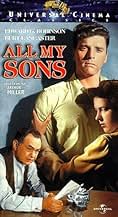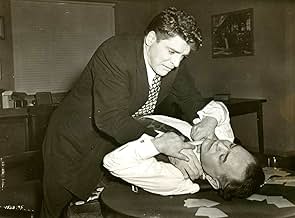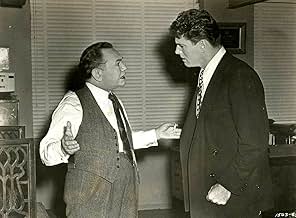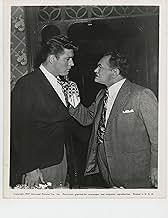VALUTAZIONE IMDb
7,3/10
2589
LA TUA VALUTAZIONE
Durante la Seconda Guerra Mondiale, l'industriale Joe Keller commette un crimine e inganna il suo socio Herbert Deever ma anni dopo il suo peccato torna a tormentarlo.Durante la Seconda Guerra Mondiale, l'industriale Joe Keller commette un crimine e inganna il suo socio Herbert Deever ma anni dopo il suo peccato torna a tormentarlo.Durante la Seconda Guerra Mondiale, l'industriale Joe Keller commette un crimine e inganna il suo socio Herbert Deever ma anni dopo il suo peccato torna a tormentarlo.
- Regia
- Sceneggiatura
- Star
- Premi
- 2 vittorie e 2 candidature totali
Harry Morgan
- Frank Lubey
- (as Henry Morgan)
Margaret Bert
- Townswoman
- (non citato nei titoli originali)
Walter Bonn
- Jorgenson
- (non citato nei titoli originali)
Helen Brown
- Mrs. Hamilton
- (non citato nei titoli originali)
Pat Flaherty
- Bartender
- (non citato nei titoli originali)
Jack Gargan
- Workman
- (non citato nei titoli originali)
Harry Harvey
- Judge
- (non citato nei titoli originali)
Jerry Hausner
- Halliday
- (non citato nei titoli originali)
Herbert Heywood
- McGraw
- (non citato nei titoli originali)
Recensioni in evidenza
Excellent film dealing with Arthur Miller's story of a man who sold defective plane parts to the military during World War 11 resulting in the death of many pilots.
Edward G. Robinson gave us an outstanding performance as the conflicted individual, who did this for his own selfish-interests only to escape prosecution but to see his partner jailed.
This is a story of intense inter-family conflicts. The partner's daughter was to be married to Joe's (Robinson's) son Larry in the film. The picture begins with the fact that Larry is missing in action. Ann, played by Louisa Horton, is now becoming engaged to Joe's other son, Chris, played with marvelous insight by a young Burt Lancaster.
Mady Christians is also a standout as Joe's devoted wife, who herself is in denial that Larry is probably dead and knowing full well what her husband did was wrong.
This is a terrific film dealing with moral conflict and the ultimate tragic resolution to it.
You have to wonder what Edward G. Robinson had to do to be nominated for an academy award.
This is Arthur Miller at his best writing. A truly American classic.
Edward G. Robinson gave us an outstanding performance as the conflicted individual, who did this for his own selfish-interests only to escape prosecution but to see his partner jailed.
This is a story of intense inter-family conflicts. The partner's daughter was to be married to Joe's (Robinson's) son Larry in the film. The picture begins with the fact that Larry is missing in action. Ann, played by Louisa Horton, is now becoming engaged to Joe's other son, Chris, played with marvelous insight by a young Burt Lancaster.
Mady Christians is also a standout as Joe's devoted wife, who herself is in denial that Larry is probably dead and knowing full well what her husband did was wrong.
This is a terrific film dealing with moral conflict and the ultimate tragic resolution to it.
You have to wonder what Edward G. Robinson had to do to be nominated for an academy award.
This is Arthur Miller at his best writing. A truly American classic.
A standard 1940s group of ensemble players, coupled with the strength of an Arthur Miller project. All cast principles and minor players were at the top of their forms when they stood before the cameras. None were noted as powerful stage actors in their own right. Yet when they appeared in this film, they succeeded in doing what I think a significant stage work should do. Carry the viewer into the stage (not film) theater, and give them the unique experience of a Broadway or Off-Broadway theater seat.
The production style and direction (for reasons of cost and utility) let the words of Miller's play take center stage. In beautiful black-and-white, the Art and Set direction are spare, firm, and commanding. They command our attention. Miller is big on attention to the issues his characters are grappling with and their impact on the significant issues of our (and all) time.
As Miller repeats in Death of a Salesman, there are layers of meaning and understanding between his characters and the issues they confront internally and externally. The two business partners have had a long, intimate family relationship (like Cain and Able). So close a connection that his son could have married his partner's daughter. And she, of course, is the only one who has always known (from that son) the truth about the son's death. And the fact (s) about the father.
Miller shows us that the father's Horatio Alger lies are at the foundation of who we are individually and collectively as Americans; the lies can almost thoroughly wash out what individuals and a community should think about its leading citizens. It is an interesting plot twist that, as Miller's script points out, the low-class birth and poverty of the father embed him into the fabric of the community.
That the film faithfully carried Miller's message of contempt and loathing not only for the worship of that false god(capitalism) but also for the whole Horatio Alger hero myth (that both American liberals and conservatives embrace) is quite daring. Even for a film world that had not yet descended into the long night of the "Black List."
The production style and direction (for reasons of cost and utility) let the words of Miller's play take center stage. In beautiful black-and-white, the Art and Set direction are spare, firm, and commanding. They command our attention. Miller is big on attention to the issues his characters are grappling with and their impact on the significant issues of our (and all) time.
As Miller repeats in Death of a Salesman, there are layers of meaning and understanding between his characters and the issues they confront internally and externally. The two business partners have had a long, intimate family relationship (like Cain and Able). So close a connection that his son could have married his partner's daughter. And she, of course, is the only one who has always known (from that son) the truth about the son's death. And the fact (s) about the father.
Miller shows us that the father's Horatio Alger lies are at the foundation of who we are individually and collectively as Americans; the lies can almost thoroughly wash out what individuals and a community should think about its leading citizens. It is an interesting plot twist that, as Miller's script points out, the low-class birth and poverty of the father embed him into the fabric of the community.
That the film faithfully carried Miller's message of contempt and loathing not only for the worship of that false god(capitalism) but also for the whole Horatio Alger hero myth (that both American liberals and conservatives embrace) is quite daring. Even for a film world that had not yet descended into the long night of the "Black List."
All My Sons (1948) :
Brief Review -
A terrific human guilt drama that reflects family pressure and a long-living conscience. Irving Reis's family drama is neither entertaining nor strained, but quite suspenseful. The idea of keeping the mystery unwrapped till the end was certainly new for family dramas back then, or is even today. Also, World War reference and the corporate business culture during the war period fit perfectly here. Joe Keller had been accused of murdering army officers due to a faulty shipment years ago. The court and juries acquitted him and grabbed his business partner, Herb. Now, years later, Herb's daughter and Joe's son want to get married, but Herb's son learns the truth and wants his sister to stay away from Joe and his family. The girl was previously engaged to Joe's first son, who disappeared years ago, and that's why the other son can't marry her as the mother is still hoping for that son to return home. What is the truth? Well, I guess you know it by now, or you can sense it halfway while watching the movie, but that doesn't kill the suspense at all. It eventually becomes more interesting because of its consequences. Things are predictable, but never boring. Every character offers something different. Every character has a problem of its own, and that's how they get involved with each other and then find a solution. The film has terrific speed, and the screenplay makes sure you don't get away from your sofa. The tension feels real and intriguing. Edward G. Robinson is fantastic as the man of the family, the man with the guilt, and the man with the responsibility. I couldn't have imagined him and Burt Lancaster playing father and son in the 40s, but it came out so well. Louisa Horton is another star performer, along with Mady Christians. I shall give full marks to Irving Reis for keeping me hooked and gripped for 95 minutes with the drama that I thought couldn't hold me. Reis makes sure the engagement gets an intellectual and burning ending, so don't miss it.
RATING - 7/10*
By - #samthebestest.
A terrific human guilt drama that reflects family pressure and a long-living conscience. Irving Reis's family drama is neither entertaining nor strained, but quite suspenseful. The idea of keeping the mystery unwrapped till the end was certainly new for family dramas back then, or is even today. Also, World War reference and the corporate business culture during the war period fit perfectly here. Joe Keller had been accused of murdering army officers due to a faulty shipment years ago. The court and juries acquitted him and grabbed his business partner, Herb. Now, years later, Herb's daughter and Joe's son want to get married, but Herb's son learns the truth and wants his sister to stay away from Joe and his family. The girl was previously engaged to Joe's first son, who disappeared years ago, and that's why the other son can't marry her as the mother is still hoping for that son to return home. What is the truth? Well, I guess you know it by now, or you can sense it halfway while watching the movie, but that doesn't kill the suspense at all. It eventually becomes more interesting because of its consequences. Things are predictable, but never boring. Every character offers something different. Every character has a problem of its own, and that's how they get involved with each other and then find a solution. The film has terrific speed, and the screenplay makes sure you don't get away from your sofa. The tension feels real and intriguing. Edward G. Robinson is fantastic as the man of the family, the man with the guilt, and the man with the responsibility. I couldn't have imagined him and Burt Lancaster playing father and son in the 40s, but it came out so well. Louisa Horton is another star performer, along with Mady Christians. I shall give full marks to Irving Reis for keeping me hooked and gripped for 95 minutes with the drama that I thought couldn't hold me. Reis makes sure the engagement gets an intellectual and burning ending, so don't miss it.
RATING - 7/10*
By - #samthebestest.
ALL MY SONS may have been slightly diluted for the screen as compared to the stage play which implicated corruption and wartime profiteering on a higher level than just one or two business men, but it's still powerful stuff and extremely well directed by Irving Reis. Individual scenes have a strength that is impressive, largely due to the excellent central performances of BURT LANCASTER, EDWARD G. ROBINSON and MADY CHRISTIANS. Robinson, in particular, makes the most of a meaty role that has him cocky and confident one moment, then bruised and bitter the next as his past crimes catch up with him--and his conscience.
Seems that during WWII, he and his partner (FRANK CONROY) were pressured to finish making cylinder parts for airplanes on the government's tight schedule and knowingly sent defective parts which caused the death of twenty-one pilots when their planes went down. Robinson has been hiding the truth from himself and his neighbors ever since, concerned only with making a decent living for himself and his family in suburban America.
Conflicts arise when others around him begin to question his role in the crime that sent his partner to jail. The son of the jailed partner, played in rather stiff fashion by HOWARD DUFF, is unforgiving when he realizes Robinson shared the guilt with his father and yet let his father take the blame for the incident. Lancaster, too, and his girlfriend (LOUISA HORTON) who happens to be Duff's sister, also bring the conflicts into the open when they start asking for answers and probing for the truth. Horton is rather colorless in what is meant to be a sympathetic role and spent her remaining years in TV roles.
But it's EDWARD G. ROBINSON who makes the biggest impression as the father, proud of his achievements and obviously in denial until his son, Lancaster, makes him realize why his other son never returned from the war--which leads to a tragic ending.
Summing up: Somber drama never quite overcomes its stage origins but it's still powerful stuff.
Trivia note: The only implausible factor in the casting--the physical impossibility of BURT LANCASTER as Robinson's son, when he bears no physical resemblance whatsoever to Eddie--nor Mady Christians for that matter!
Seems that during WWII, he and his partner (FRANK CONROY) were pressured to finish making cylinder parts for airplanes on the government's tight schedule and knowingly sent defective parts which caused the death of twenty-one pilots when their planes went down. Robinson has been hiding the truth from himself and his neighbors ever since, concerned only with making a decent living for himself and his family in suburban America.
Conflicts arise when others around him begin to question his role in the crime that sent his partner to jail. The son of the jailed partner, played in rather stiff fashion by HOWARD DUFF, is unforgiving when he realizes Robinson shared the guilt with his father and yet let his father take the blame for the incident. Lancaster, too, and his girlfriend (LOUISA HORTON) who happens to be Duff's sister, also bring the conflicts into the open when they start asking for answers and probing for the truth. Horton is rather colorless in what is meant to be a sympathetic role and spent her remaining years in TV roles.
But it's EDWARD G. ROBINSON who makes the biggest impression as the father, proud of his achievements and obviously in denial until his son, Lancaster, makes him realize why his other son never returned from the war--which leads to a tragic ending.
Summing up: Somber drama never quite overcomes its stage origins but it's still powerful stuff.
Trivia note: The only implausible factor in the casting--the physical impossibility of BURT LANCASTER as Robinson's son, when he bears no physical resemblance whatsoever to Eddie--nor Mady Christians for that matter!
Playwright Arthur Miller had a great deal at stake when his play 'All my Sons' opened on Broadway in 1947. He later admitted that had the play failed he would have been obliged to find another line of work. Directed by Elia Kazan and featuring a top notch cast it ran for almost two years. The rest, as they say, is history.
It did not take long of course for Hollywood to pounce and to make a version that Miller himself came to despise. This play is not the last in which Miller would show the darker side of the American Dream. Adaptor Chester Erskine has however, carefully removed any of Miller's leftist sentiments and the crime committed by Joe Keller in selling defective cylinders to the US Airforce, which results in the death of 21 pilots, is blamed on Keller's own greed rather than the Capitalist system that created him and so many like him.
To my knowledge there is nothing in the previous films of Irving Reis that would suggest his being capable of doing justice to this material and his direction lacks fluidity. He is aided by the 'noirish' touches of cinematographer Russell Metty and an understated score by Leith Stevens. In keeping with the inevitable compromise of film, some characters, notably Dr. and Mrs. Bayliss, have been diminished. Keller's business partner Deever who has taken the rap for the crime and is only spoken of in the play, is here given a speaking role which is filmically very effective. Deever's daughter Ann is played by Louisa Horton who is not a typical Hollywood glamour puss by any means but whose directness and sincerity make her excellent casting. This was to be her first and only film role of note. Burt Lancaster plays Keller's son Chris. Although keen to improve as an actor, Lancaster's charisma works against him here and he does not really convince as an average Joe. As Deever's son, Howard Gruff is as Duff as ever and strictly one dimensional. The strength of the film lies in the performances of Edward G. Robinson and Mady Christians as Joe and Kate. Robinson is superlative as a man whose outward bonhomie and confidence conceal a terrible sense of guilt. His assertions that he did it 'for the family' have a hollow ring. Kate is living in a fantasy world, clinging to the belief that their son Larry, reported lost in action, will return. The devastating scene in which she reads the letter confirming his death is beautifully played.
Ironically Miller, Robinson and Christians were all summoned by the HUAC for alleged Communist leanings. Miller emerged unscathed, Robinson's 'A' listing suffered throughout the 1950's until Cecil B. de Mille came to his rescue but Christians was not so fortunate. Her outspokenness not only shattered her career but ended her life.
This piece is decidedly not filmed theatre. It is cinema but alas, not great cinema.
It did not take long of course for Hollywood to pounce and to make a version that Miller himself came to despise. This play is not the last in which Miller would show the darker side of the American Dream. Adaptor Chester Erskine has however, carefully removed any of Miller's leftist sentiments and the crime committed by Joe Keller in selling defective cylinders to the US Airforce, which results in the death of 21 pilots, is blamed on Keller's own greed rather than the Capitalist system that created him and so many like him.
To my knowledge there is nothing in the previous films of Irving Reis that would suggest his being capable of doing justice to this material and his direction lacks fluidity. He is aided by the 'noirish' touches of cinematographer Russell Metty and an understated score by Leith Stevens. In keeping with the inevitable compromise of film, some characters, notably Dr. and Mrs. Bayliss, have been diminished. Keller's business partner Deever who has taken the rap for the crime and is only spoken of in the play, is here given a speaking role which is filmically very effective. Deever's daughter Ann is played by Louisa Horton who is not a typical Hollywood glamour puss by any means but whose directness and sincerity make her excellent casting. This was to be her first and only film role of note. Burt Lancaster plays Keller's son Chris. Although keen to improve as an actor, Lancaster's charisma works against him here and he does not really convince as an average Joe. As Deever's son, Howard Gruff is as Duff as ever and strictly one dimensional. The strength of the film lies in the performances of Edward G. Robinson and Mady Christians as Joe and Kate. Robinson is superlative as a man whose outward bonhomie and confidence conceal a terrible sense of guilt. His assertions that he did it 'for the family' have a hollow ring. Kate is living in a fantasy world, clinging to the belief that their son Larry, reported lost in action, will return. The devastating scene in which she reads the letter confirming his death is beautifully played.
Ironically Miller, Robinson and Christians were all summoned by the HUAC for alleged Communist leanings. Miller emerged unscathed, Robinson's 'A' listing suffered throughout the 1950's until Cecil B. de Mille came to his rescue but Christians was not so fortunate. Her outspokenness not only shattered her career but ended her life.
This piece is decidedly not filmed theatre. It is cinema but alas, not great cinema.
Lo sapevi?
- QuizThe original Broadway production of "All My Sons" opened at the Coronet Theater in New York on January 29, 1947. It ran for 328 performances, and won the 1947 Best Play Tony Award for author Arthur Miller. His original script was used as the basis for this movie's screenplay.
- BlooperWhen Joe comes out of the house upon Annie's arrival, he comes down the front steps and walks into the yard with his arms raised. In the next instant, he's back at the steps and his arms are down.
- Citazioni
Jim Bayliss: Put her to bed, Joe. Both of you go to bed. Staying up won't help; sleep will. Sleep's a wonderful thing, the best thing about living.
- ConnessioniFeatured in Film Preview: Episodio #1.1 (1966)
I più visti
Accedi per valutare e creare un elenco di titoli salvati per ottenere consigli personalizzati
- How long is All My Sons?Powered by Alexa
Dettagli
- Data di uscita
- Paese di origine
- Siti ufficiali
- Lingua
- Celebre anche come
- All My Sons
- Luoghi delle riprese
- Santa Rosa, California, Stati Uniti(the Grace home on McDonald Avenue)
- Azienda produttrice
- Vedi altri crediti dell’azienda su IMDbPro
- Tempo di esecuzione
- 1h 34min(94 min)
- Colore
- Proporzioni
- 1.37 : 1
Contribuisci a questa pagina
Suggerisci una modifica o aggiungi i contenuti mancanti


































